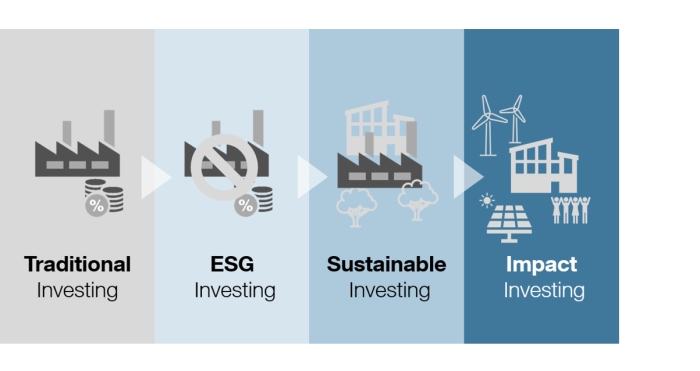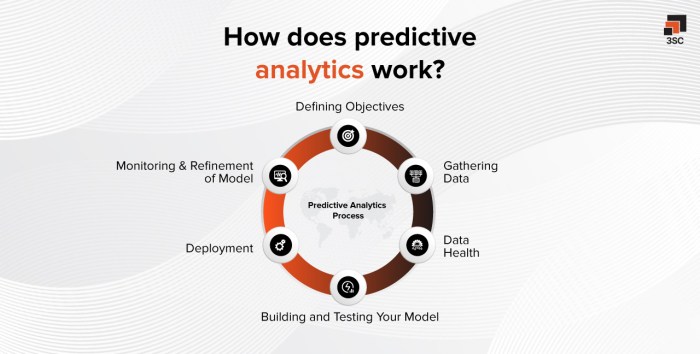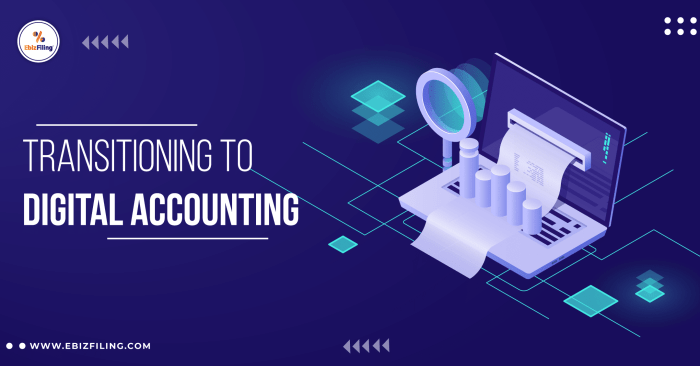The Role of Artificial Intelligence in Accounting Evolution marks a pivotal shift in the industry. Historically, accounting relied heavily on manual processes and basic technological tools. However, the rapid advancements in AI are transforming how accounting tasks are performed, from data entry to complex financial analysis. This evolution presents both significant opportunities and challenges, impacting not only the efficiency of operations but also the very nature of accounting roles and the skills required to excel in the field. This exploration will delve into the transformative power of AI, examining its applications, impact, and ethical considerations within the accounting profession.
We will explore the specific AI tools automating routine tasks, analyze the enhanced audit capabilities through AI algorithms, and examine its use in predictive financial modeling. Furthermore, we will address the evolving roles of accountants, necessary skill adaptations, and the ethical and regulatory frameworks shaping the responsible integration of AI. Case studies will showcase successful AI implementations, highlighting the tangible benefits and paving the way for a discussion of future trends and predictions for the accounting landscape.
Introduction to AI in Accounting
The evolution of accounting practices mirrors technological advancements. From rudimentary manual ledgers to sophisticated enterprise resource planning (ERP) systems, technology has consistently reshaped how financial data is recorded, analyzed, and interpreted. The integration of artificial intelligence (AI) represents the latest, and arguably most transformative, chapter in this ongoing evolution. This section will explore the historical context of this integration, the key drivers behind AI’s growing adoption, and the potential benefits and challenges associated with AI-driven accounting solutions.
Accounting’s technological journey began with simple calculators and progressed through the development of spreadsheets and specialized accounting software. These advancements automated routine tasks, improving efficiency and accuracy. However, the sheer volume of data generated by modern businesses and the increasing complexity of financial regulations created a need for more sophisticated tools. This demand, coupled with the advancements in AI capabilities, has fueled the rapid integration of AI into accounting.
Key Drivers of AI Adoption in Accounting
Several factors are driving the increased adoption of AI in the accounting field. The ever-growing volume and complexity of financial data are primary concerns. AI algorithms excel at processing large datasets quickly and accurately, identifying patterns and anomalies that might be missed by human accountants. Furthermore, the need for enhanced accuracy and reduced error rates is paramount. AI systems can minimize human error, ensuring compliance with accounting standards and minimizing the risk of costly mistakes. Finally, the demand for real-time insights and predictive analytics is transforming the accounting profession. AI can provide immediate, data-driven insights, allowing businesses to make more informed decisions and proactively manage their finances.
Potential Benefits of AI-Driven Accounting Solutions
AI offers significant benefits to accounting firms and businesses. Automation of repetitive tasks, such as data entry and reconciliation, frees up human accountants to focus on higher-value activities like financial analysis and strategic planning. Enhanced accuracy and reduced error rates lead to improved financial reporting and regulatory compliance. AI-powered systems can detect fraudulent activities more effectively than traditional methods, safeguarding businesses against financial losses. Finally, AI can provide real-time insights and predictive analytics, enabling better financial forecasting and decision-making. For example, AI can analyze sales data to predict future revenue streams, allowing businesses to optimize their resource allocation and budget more effectively.
Challenges of AI-Driven Accounting Solutions
Despite the considerable benefits, the adoption of AI in accounting also presents several challenges. The high initial investment costs of implementing AI systems can be a barrier for smaller firms. Data security and privacy concerns are crucial; robust security measures are essential to protect sensitive financial data. The need for skilled professionals to manage and interpret AI-generated insights is also a critical consideration. Furthermore, the lack of transparency in some AI algorithms can make it difficult to understand how decisions are made, raising concerns about accountability and auditability. For instance, the “black box” nature of some deep learning models can make it challenging to explain the reasoning behind a particular fraud detection alert, potentially leading to distrust and hindering adoption.
AI Applications in Accounting Tasks: The Role Of Artificial Intelligence In Accounting Evolution
Artificial intelligence is rapidly transforming the accounting profession, automating tedious tasks and enabling accountants to focus on higher-value activities like strategic analysis and client consultation. The integration of AI tools offers significant improvements in efficiency, accuracy, and the overall quality of accounting services. This section will explore several key applications of AI within accounting tasks.
AI-Powered Automation of Routine Tasks
Many routine accounting tasks, such as data entry, invoice processing, and reconciliation, are now being automated using AI-powered tools. These tools leverage machine learning algorithms to learn from past data and improve their accuracy over time. This automation frees up human accountants to focus on more complex and strategic tasks.
| AI Accounting Tool | Key Features | Limitations | Example Use Case |
|---|---|---|---|
| Xero | Automated invoice processing, bank reconciliation, expense tracking, reporting | May require manual intervention for complex transactions; integration with other systems may be limited. | Small to medium-sized businesses automating their accounts payable and receivable processes. |
| QuickBooks Online | Automated bank feeds, expense categorization, invoice creation, financial reporting | Limited advanced analytics capabilities compared to dedicated AI solutions; reliance on accurate data input. | Freelancers and small businesses managing their finances and generating reports. |
| Zoho Books | Automated invoice generation, expense tracking, bank reconciliation, inventory management | Steeper learning curve compared to some competitors; customization options might be limited for large enterprises. | Businesses needing integrated CRM and accounting software. |
| Sage Intacct | Advanced automation for complex accounting processes, robust reporting and analytics, strong integration capabilities | Higher cost compared to other solutions; requires more technical expertise to implement and maintain. | Large enterprises with complex accounting needs and multiple locations. |
| SAP S/4HANA | Comprehensive suite of accounting and financial management tools, including AI-powered automation and analytics | Very high implementation cost and complexity; requires significant IT infrastructure and expertise. | Very large multinational corporations requiring enterprise-level accounting and financial management capabilities. |
AI’s Role in Enhancing Audit Processes, The Role of Artificial Intelligence in Accounting Evolution
AI algorithms are significantly enhancing audit processes by improving risk assessment and fraud detection capabilities. Machine learning models can analyze vast datasets of financial transactions to identify anomalies and patterns indicative of fraudulent activities. This proactive approach allows auditors to focus their efforts on high-risk areas, increasing the efficiency and effectiveness of audits. AI can also help automate the testing of controls and generate reports, further improving audit quality and reducing the time required for completion.
AI in Financial Forecasting and Predictive Analytics
AI plays a crucial role in financial forecasting and predictive analytics by leveraging machine learning algorithms to analyze historical financial data, market trends, and other relevant factors to predict future financial performance. This allows businesses to make more informed decisions about resource allocation, investment strategies, and risk management.
AI-driven financial forecasting typically involves a multi-step process:
- Data Collection and Preparation: Gathering relevant historical financial data, economic indicators, and market trends. This data needs to be cleaned, transformed, and prepared for analysis.
- Model Selection: Choosing an appropriate machine learning model (e.g., time series analysis, regression models) based on the data and the forecasting objective.
- Model Training: Training the selected model on the prepared data to learn patterns and relationships.
- Model Validation: Evaluating the model’s accuracy and reliability using various statistical metrics and techniques.
- Forecasting: Using the trained model to generate forecasts for future periods.
- Monitoring and Refinement: Continuously monitoring the model’s performance and making adjustments as needed to maintain accuracy and relevance.
For example, a retail company might use AI to predict sales based on past sales data, seasonality, and promotional campaigns. This prediction could then inform inventory management decisions and staffing levels. Similarly, a bank might use AI to predict loan defaults based on borrower characteristics and economic indicators.
AI’s Impact on Accounting Roles and Skills
The integration of artificial intelligence (AI) into accounting is fundamentally reshaping the profession, altering the nature of many roles and demanding a shift in the skillsets needed to thrive. While AI automates certain tasks, it also creates new opportunities requiring a blend of technical and analytical expertise. This evolution necessitates a proactive approach to upskilling and reskilling within the accounting workforce.
AI’s impact on accounting roles is multifaceted, affecting both routine and strategic functions. The changes are not about replacing accountants entirely, but rather augmenting their capabilities and freeing them to focus on higher-value activities. This shift requires a careful consideration of both the evolving demands of the profession and the necessary adaptations in education and training.
Accounting Roles Most Impacted by AI and Their Evolution
AI is significantly impacting roles heavily reliant on repetitive, data-intensive tasks. For example, data entry clerks and junior accountants who previously spent considerable time on tasks like invoice processing and reconciliation are seeing their roles transformed. These roles are not disappearing entirely, but their responsibilities are evolving. Instead of manual data entry, these professionals may now focus on data quality control, exception handling (identifying instances where AI flags potential errors), and using AI-generated insights to improve processes. Similarly, roles focused on financial reporting are being impacted, with AI assisting in automating the generation of reports, freeing up accountants to analyze the data and provide more strategic insights to management. Senior roles, such as financial analysts and audit managers, are also being affected, with AI tools enhancing their analytical capabilities and enabling them to work with larger datasets and more complex analyses.
Comparison of Required Skills: Pre-AI vs. AI-Integrated Environment
The skills required for accountants have undergone a significant transformation. In a pre-AI environment, proficiency in manual data entry, basic accounting principles, and spreadsheet software (like Excel) were paramount. Accountants primarily focused on processing and compiling data. The current AI-integrated environment demands a different skillset. While a foundational understanding of accounting principles remains crucial, the emphasis has shifted towards data analysis, critical thinking, problem-solving, and the ability to interpret and utilize AI-generated insights. Proficiency in data visualization tools and programming languages (like Python or R) is becoming increasingly valuable, as is an understanding of AI algorithms and their limitations. Furthermore, strong communication and collaboration skills are essential to effectively work alongside AI tools and communicate complex findings to stakeholders.
Training Program for Accountants: Upskilling and Reskilling
A comprehensive training program should incorporate several key elements to equip accountants for the AI-driven future. The program should be modular and flexible, allowing accountants to tailor their learning to their specific roles and needs.
The curriculum should begin with foundational courses on AI concepts and applications in accounting. This would cover topics such as machine learning, natural language processing, and robotic process automation (RPA), explaining how these technologies are being applied in accounting and auditing. Subsequent modules should focus on specialized skills such as data analysis using tools like SQL and Tableau, and programming languages like Python or R. Hands-on workshops using real-world accounting datasets and AI tools would be crucial for practical application. Finally, the program should include modules on ethical considerations related to AI in accounting, data privacy, and algorithmic bias. The program should also emphasize soft skills, such as critical thinking, problem-solving, communication, and collaboration. Continuous professional development (CPD) opportunities, including online courses, webinars, and industry conferences, would ensure that accountants remain updated with the latest advancements in AI and its applications. This multi-faceted approach ensures that accountants are not only technically proficient but also equipped to navigate the ethical and strategic implications of AI in their work.
Ethical and Regulatory Considerations
The integration of artificial intelligence (AI) into accounting practices presents a complex landscape of ethical and regulatory challenges. While AI offers significant advantages in terms of efficiency and accuracy, its implementation necessitates careful consideration of potential risks and the establishment of robust frameworks to ensure responsible use. Addressing these concerns proactively is crucial for maintaining public trust and ensuring the integrity of the accounting profession.
The use of AI in accounting raises several ethical concerns, primarily revolving around data privacy and algorithmic bias. Data privacy is paramount, especially given the sensitive financial information handled by accounting firms. Algorithmic bias, stemming from flawed data sets used to train AI systems, can lead to discriminatory outcomes, potentially impacting individuals or businesses unfairly. These ethical considerations necessitate the development and implementation of stringent guidelines and regulations.
Data Privacy and Algorithmic Bias in AI-driven Accounting
Protecting sensitive financial data is crucial. AI systems often require access to vast datasets for training and operation, increasing the risk of data breaches and unauthorized access. Robust data encryption, access control measures, and anonymization techniques are essential to mitigate these risks. Furthermore, the potential for algorithmic bias necessitates rigorous testing and validation of AI systems to ensure fairness and prevent discriminatory outcomes. For example, an AI system trained on historical data that reflects existing societal biases could perpetuate these biases in its decisions, leading to unfair loan approvals or tax assessments. Addressing this requires careful curation of training data and ongoing monitoring of AI system outputs for potential bias.
Existing Regulations and Guidelines for AI in Accounting
While a comprehensive global regulatory framework specifically for AI in accounting is still evolving, several existing regulations and guidelines provide a foundation. General data protection regulations, such as the European Union’s General Data Protection Regulation (GDPR) and the California Consumer Privacy Act (CCPA), impose stringent requirements on the collection, processing, and storage of personal data, including financial information. Professional accounting bodies, such as the American Institute of Certified Public Accountants (AICPA) and the Institute of Internal Auditors (IIA), are also developing guidelines and best practices for the ethical and responsible use of AI in accounting. These guidelines often address issues such as data security, auditability, and the need for human oversight in AI-driven processes. For instance, the AICPA has published resources focusing on the implications of AI for auditing and the importance of maintaining auditor independence even when utilizing AI tools.
Future Regulatory Landscape for AI in Accounting
The future regulatory landscape for AI in accounting is likely to be characterized by increased scrutiny and the development of more specific regulations. As AI systems become more sophisticated and integrated into accounting processes, the need for clear guidelines to govern their use will become increasingly critical. We can anticipate a greater emphasis on transparency and explainability in AI algorithms, allowing for greater understanding and accountability. Regulations might also focus on ensuring the competence and training of professionals working with AI systems in accounting. Furthermore, international cooperation will be vital in establishing consistent standards and preventing regulatory arbitrage. The ongoing development of AI technology and its increasing impact on the accounting profession will necessitate a dynamic and adaptive regulatory approach, capable of addressing emerging challenges and ensuring the responsible and ethical use of AI. Looking ahead, we can expect to see a convergence of existing data protection laws and emerging AI-specific regulations to create a more comprehensive framework that balances innovation with responsible use. The potential for cross-border data flows and the global nature of many accounting firms will also drive the need for international harmonization of AI regulations.
Case Studies of AI Implementation in Accounting Firms

The successful integration of artificial intelligence (AI) in accounting is no longer a futuristic concept; it’s a rapidly evolving reality. Several accounting firms have embraced AI, reaping significant benefits in terms of efficiency, accuracy, and profitability. Examining these real-world examples provides valuable insights into the practical applications and potential impact of AI within the accounting profession.
Deloitte’s AI-Powered Audit Solutions
Deloitte, one of the “Big Four” accounting firms, has extensively integrated AI into its audit processes. They utilize machine learning algorithms to analyze vast datasets, identifying anomalies and potential risks far more efficiently than traditional manual methods. This allows auditors to focus on higher-level analysis and complex decision-making, rather than being bogged down in repetitive tasks.
Key Success Factors:
- Significant investment in AI infrastructure and talent acquisition.
- Strategic partnerships with leading AI technology providers.
- A phased implementation approach, starting with pilot projects and gradually scaling up.
- Robust data security and privacy protocols to ensure compliance with regulations.
Measurable Impact:
Deloitte has reported significant improvements in audit efficiency, reducing the time required for certain tasks by up to 50%. This has translated into cost savings and increased profitability, allowing them to handle a larger volume of audits while maintaining high quality. Accuracy has also improved due to the AI’s ability to detect subtle patterns and anomalies that might be missed by human auditors.
EY’s Use of AI for Tax Compliance
Ernst & Young (EY), another prominent accounting firm, leverages AI to enhance its tax compliance services. Their AI-powered tools automate the process of data collection, analysis, and reporting, significantly reducing the risk of human error and improving overall accuracy. This allows tax professionals to dedicate more time to strategic tax planning and client advisory services.
Key Success Factors:
- Development of proprietary AI algorithms tailored to specific tax regulations.
- Integration of AI tools with existing tax software and platforms.
- Training and upskilling of tax professionals to effectively utilize AI tools.
- Focus on user-friendly interfaces to ensure seamless adoption by employees.
Measurable Impact:
EY has reported a substantial reduction in the time required for tax compliance tasks, resulting in increased efficiency and cost savings. The improved accuracy of AI-powered tools has minimized the risk of penalties and legal issues related to tax reporting. This has enhanced client satisfaction and strengthened EY’s reputation for delivering high-quality tax services.
KPMG’s AI-Driven Financial Forecasting
KPMG has implemented AI-based solutions to improve the accuracy and efficiency of financial forecasting. Their AI algorithms analyze historical financial data, market trends, and economic indicators to generate more accurate and reliable forecasts. This enables businesses to make better informed decisions regarding investments, resource allocation, and strategic planning.
Key Success Factors:
- Collaboration with data scientists and financial experts to develop robust AI models.
- Integration of AI tools with existing financial planning and analysis (FP&A) systems.
- Regular monitoring and evaluation of AI model performance to ensure accuracy.
- Communication and training to ensure client understanding and acceptance of AI-driven insights.
Measurable Impact:
KPMG has reported improved accuracy in financial forecasts, leading to better decision-making by clients. The speed and efficiency of the AI-driven forecasting process have allowed clients to react more quickly to market changes and opportunities. This has resulted in improved financial performance and increased client satisfaction.
Visual Representation of AI Implementation at Deloitte (Example)
Before AI implementation, a visual representation might show a team of auditors manually reviewing thousands of documents, highlighting potential issues with highlighters and sticky notes, a process prone to errors and time-consuming. This could be depicted as a cluttered desk with stacks of papers and stressed-out auditors. After AI implementation, the same scenario would show the auditors using sophisticated software dashboards displaying data visualizations and anomaly alerts, highlighting key issues efficiently. The image would show a cleaner, more organized workspace with auditors collaboratively analyzing data on large screens, reflecting a more efficient and less stressful work environment. The overall visual contrast would emphasize the shift from manual, labor-intensive processes to streamlined, AI-powered workflows.
Future Trends and Predictions

The integration of artificial intelligence (AI) into accounting is still in its relatively early stages, yet its transformative potential is already evident. Looking ahead, we can anticipate significant advancements that will reshape the accounting profession in profound ways, impacting everything from daily tasks to the overall structure of the industry. These changes will be driven by both technological innovations and evolving business needs.
The coming decade will witness a convergence of AI with other transformative technologies, leading to even more sophisticated and efficient accounting practices. This evolution will necessitate a corresponding shift in the skills and training required for accounting professionals.
AI and Blockchain Integration
Blockchain technology, with its inherent security and transparency, offers a compelling synergy with AI in accounting. AI algorithms can analyze vast amounts of blockchain data to identify anomalies, detect fraud, and automate audit processes. For example, imagine AI-powered systems automatically verifying transactions on a distributed ledger, instantly flagging inconsistencies or potential irregularities. This would significantly reduce the time and resources currently dedicated to manual reconciliation and fraud detection. Furthermore, smart contracts, self-executing contracts with the terms of the agreement between buyer and seller being directly written into lines of code, can be audited and managed by AI, ensuring compliance and streamlining contract management within accounting functions. This level of automation promises to dramatically improve accuracy and efficiency in financial reporting and compliance.
AI’s Role in Accounting Education and Training
The increasing prevalence of AI in accounting necessitates a fundamental shift in accounting education and training. Curriculum will need to incorporate AI literacy, teaching students how to work alongside and leverage AI tools. This means not just learning accounting principles, but also understanding how AI algorithms function, how to interpret AI-generated insights, and how to manage and interpret the data output from these systems. Universities and professional organizations are already beginning to adapt, integrating AI-focused modules into existing programs and developing specialized AI-related certifications. For instance, some universities now offer courses on data analytics and AI specifically designed for accounting students, preparing them for the demands of the evolving job market. This proactive approach to education will be crucial in bridging the skills gap and ensuring that accounting professionals are adequately equipped to navigate the AI-driven future.
AI’s Reshaping of the Accounting Profession (Next 5-10 Years)
Over the next 5-10 years, AI is predicted to significantly reshape the accounting profession. Routine tasks like data entry, reconciliation, and basic bookkeeping will be largely automated, freeing up human accountants to focus on higher-level tasks requiring critical thinking, judgment, and strategic analysis. The demand for roles requiring advanced analytical skills, such as data science and AI auditing, will increase significantly. We can expect to see the rise of new specialized roles focusing on AI implementation, management, and ethical considerations within accounting firms. For example, the role of “AI Auditor” will become increasingly crucial, responsible for overseeing and verifying the accuracy and reliability of AI-driven processes. Furthermore, the focus will shift from compliance-based tasks to advisory services, with accountants leveraging AI insights to provide strategic guidance to clients. Large accounting firms are already investing heavily in AI technology and are actively recruiting professionals with expertise in data science and AI. This demonstrates the clear trend toward an AI-integrated future within the accounting profession. The adoption of AI will not eliminate jobs, but it will transform them, requiring a significant upskilling and reskilling initiative across the industry.
Last Word
In conclusion, the integration of artificial intelligence is fundamentally reshaping the accounting profession. While challenges remain regarding ethical considerations and workforce adaptation, the potential benefits in terms of efficiency, accuracy, and predictive capabilities are undeniable. The future of accounting will be defined by a synergistic relationship between human expertise and AI’s analytical power, leading to a more insightful, efficient, and resilient industry. Continuous learning, adaptation, and a proactive approach to ethical implementation will be crucial for accountants to thrive in this evolving landscape.
Essential Questionnaire
What are the biggest risks associated with using AI in accounting?
Data breaches, algorithmic bias leading to inaccurate results, and the potential for job displacement are key risks. Robust security measures, careful algorithm design, and reskilling initiatives are crucial mitigations.
How can small accounting firms benefit from AI?
Small firms can leverage AI-powered solutions for tasks like automated data entry and invoice processing, freeing up time for higher-value activities and improving efficiency despite limited resources.
Will AI completely replace human accountants?
No. While AI automates many tasks, human judgment, critical thinking, and ethical considerations remain irreplaceable aspects of accounting. The future will likely see a collaboration between humans and AI.
Browse the multiple elements of How to Manage Accounts Payable and Accounts Receivable to gain a more broad understanding.







